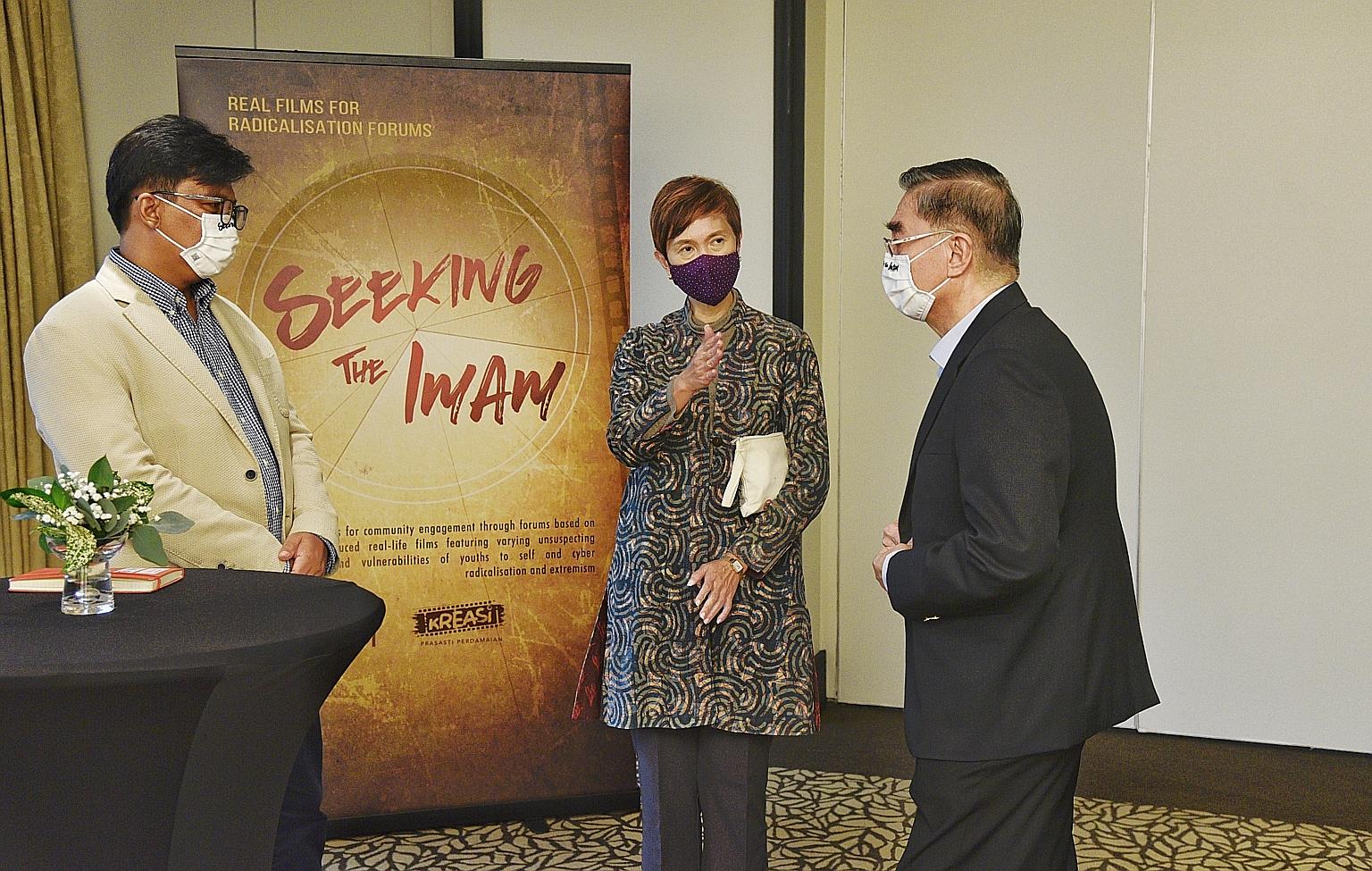29 radicalised persons dealt with in 5 years
Inter-racial and religious understanding key to keeping terror threats at bay: Josephine Teo
Sign up now: Get ST's newsletters delivered to your inbox

Second Minister for Home Affairs Josephine Teo, with terrorism expert Noor Huda Ismail (left), one of the producers of the film Seeking The Imam, and Mr Ong Keng Yong, chairman of Humanity Matters, at the film's premiere yesterday. The film will be screened at selected institutions and for community groups next year.
ST PHOTO: DESMOND WEE
In the past five years, 29 radicalised individuals, many of whom were influenced by online extremist materials, have been dealt with under the Internal Security Act, said Second Minister for Home Affairs and Manpower Minister Josephine Teo.
Speaking at yesterday's premiere of Seeking The Imam, a film on radicalisation by local non-governmental organisation Humanity Matters, Mrs Teo underscored the importance of inter-racial and religious understanding in order to keep the threats posed by terrorism and radicalisation at bay.
These threats were thrust into the spotlight earlier this week, when the Ministry of Home Affairs announced it was investigating 37 people, including 23 foreigners, for suspected radical inclinations, or for making comments that could incite violence or stoke communal unrest. Sixteen of the foreigners have been deported.
Singapore has been on heightened alert in the wake of recent terror attacks in France. French magazine Charlie Hebdo had republished caricatures of Prophet Muhammad on Sept 1, resulting in several attacks, including the beheading of teacher Samuel Paty.
Yesterday, Mrs Teo also mentioned the shootings in Vienna earlier this month that killed four people, and an explosion in Jeddah targeting French interests on Nov 11.
Although such attacks did not become key topics of discussion here, Mrs Teo said the threats are closer to Singapore than they appear. She pointed out that in South-east Asia, terrorist-linked groups are still operational and remain active as they continue to spread their ideologies online.
"We in Singapore must never assume we can ever be immune to the threat of radicalisation and terrorism," she said at the film's premiere at Furama RiverFront hotel.
The film, which will be screened at selected institutions and for community groups next year, was produced by Dr Noor Huda Ismail, a terrorism expert and visiting fellow at S. Rajaratnam School of International Studies, as well as humanitarian Hassan Ahmad.
Mrs Teo said when it comes to radicalisation, an individual might turn extremist due to weak family and community networks, but added that the Internet and social media can be significantly influential.
An individual's psychological and emotional state, which may be influenced by past traumatic experiences, also plays a part. Mrs Teo said some of the radicalised youth here were more susceptible to extremist causes due to personal issues such as domestic violence.
The minister said society must come together to counter threats posed by radicalisation, and she sketched out three ways to do so.
First, she said Singapore needs to make every effort to deepen cross-religious and cross-cultural understanding and interactions. Mrs Teo pledged that the Government will continue to be fair to all races and religions, and that it will continue to take action against hate speech.
But she added that it cannot do this alone. "Our efforts as individuals and communities, to mix with one another, understand, appreciate and defend our multicultural way of life, are essential to integration," she said.
Second, a holistic approach needs to be taken to counter radicalisation and reintegrate those who may have fallen astray. Mrs Teo said this includes community-led efforts by the Religious Rehabilitation Group and the Inter-Agency Aftercare Group.
And third, Singapore needs to be vigilant against signs of radicalisation. Mrs Teo encouraged people here to report to the authorities anyone displaying signs of radicalisation. She acknowledged that this might be tough to do, but reporting them early can prevent them from causing harm.
Mrs Teo also stressed that radicalisation is not limited to any religion or ethnic group, and brought up the Christchurch mosque shootings last year, which killed 51 people.
"Radicalisation is a poison that can seep wherever there are cracks in society," she said.


